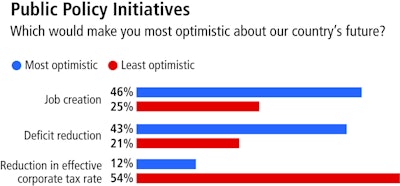
With so much uncertainty in the global markets, it is not surprising that a recent survey conducted by Grant Thornton LLP found that U.S. manufacturing leaders are extremely pessimistic about the domestic economy.
The Grant Thornton Business Optimism Index, a quarterly survey of U.S. manufacturing business leaders, found that only 13% believe the U.S. economy will improve in the next six months, down significantly from 40% in May. At the same time, 40% believe the U.S. economy will get worse, up from 26% (see Table 1).
Manufacturing has been one of the few bright spots in the economy since the end of the recession, generating more than 300,000 new jobs since December 2009, according to the National Assn. of Manufacturers (NAM). Strong export growth in 2010 and the first half of 2011 helped increase revenues and create jobs. However, the slowing global economy, coupled with a lack of confidence in economic policy, has caused senior manufacturing executives to turn cautious, particularly because these are matters they can’t control.
Grant Thornton speaks regularly to manufacturers across the country, and most say they are focused on matters that they can control, with their top three priorities being:
- Reducing costs by improving their manufacturing processes, utilizing techniques such as lean manufacturing and six sigma
- Upgrading their production equipment and IT systems to enhance their efficiency
- Improving quality and focusing on customer satisfaction
Jobs
In addition to having a more negative outlook on the economy, manufacturers were pessimistic about jobs. Only 21% said that their company plans to increase hiring in the next six months, down from 44% in May, while the number of those that plan layoffs in the coming months increased to 35% from 16% in May.
Grant Thornton’s survey also asked manufacturers what public policy initiative would make them most optimistic about the country’s future. A job creation program was most popular, with 46% of manufacturers selecting that as their first choice; followed closely by deficit reduction, with 43% of manufacturers selecting that as their first choice (see Table 2). Surprisingly, a reduction in the effective corporate tax rate came in dead last, with only 12% of business leaders selecting this as their first choice and a majority reporting that it was the public policy initiative that would make them the least optimistic about the country’s future.
These findings indicate that business leaders in manufacturing are taking a macro view--instead of just focusing on what would be beneficial to them or their companies. It’s clear they think that what’s good for the largest number of people is what will boost the economy in the long run.
Visit www.GrantThornton.com/BOI for all the past survey information.



















